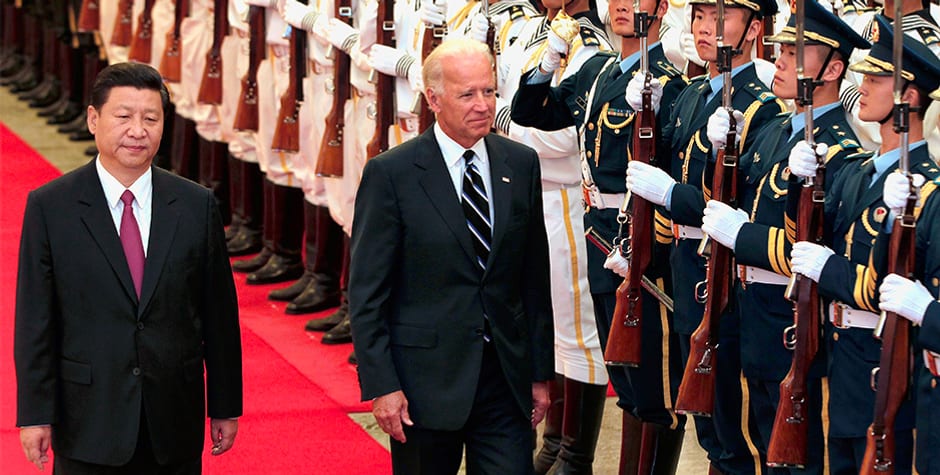U.S. Support for Taiwan Is Crucial – China's Aggression Deserves More Than a Strongly Worded Press Release
President Biden’s tenure thus far has been marked by weakness on the international stage. He bowed to Russia and Vladimir Putin almost immediately regarding the Nordstream II pipeline. He not only failed to punish Iran for launching missiles at an Israeli ship, but also still seems committed to negotiating a new nuclear deal with the malign regime. He oversaw the fatally flawed execution of a humiliating withdrawal of our troops from Afghanistan, which resulted in the death of 13 U.S. service members while hundreds of Americans are still trapped there (something the ACLJ has submitted a Freedom of Information Act (FOIA) request regarding). He has failed to hold the Chinese Communist Party (CCP) accountable for its role in the early days of the COVID pandemic (something else the ACLJ has filed a FOIA lawsuit over). He has wasted summits with our allies discussing climate change and touted its strategy of “relentless diplomacy” while America’s adversaries grow stronger and bolder.
China, under the authoritarian grip of the Chinese Communist Party led by Xi Jinping, has taken note of this weakness. Now they want to see just how far they can go with American deterrence severely weakened.
Last week, over 56 Chinese bombers and other aircraft crossed internationally recognized boundaries and flew into Taiwan airspace. It was a clear provocation to Taiwan, the United States, and the entire region. China is testing our mettle. They want to know how far they can go before America responds with something other than a strongly worded press release.
The Trump Administration’s unwavering support for Taiwan ensured that provocations such as these never happened. We strengthened America’s ties with Taiwan, making them stronger than they have ever been in history. We didn’t do this to provoke Beijing, but rather to send the Chinese Communist Party a message that America was no longer going to center our engagement with China around appeasing its communist, authoritarian rulers.
Unfortunately, the Biden Administration has chosen to prioritize other goals, such as climate change, rather than confront China. At the U.N. General Assembly meetings last month, President Biden struck a conciliatory tone regarding China, meekly stating that the United States was not “seeking a new Cold War.” Instead, he promised a strategy of “relentless diplomacy” in order to confront America’s adversaries – all without ever directly addressing his remarks to China in his speech. His goal in our relations with China has been to improve our bilateral relations, rather than assert American interests and security priorities.
This is a strategy of weakness, and Beijing knows it. Last month, top CCP officials sent John Kerry, the Biden Administration’s climate czar, home empty handed, saying that, “cooperation on climate change cannot be divorced from the overall situation of China-U.S. relations.” The CCP has seized on the Biden Administration’s obsession with global climate change politics and are now using that obsession as leverage. They are linking vital CCP objectives, such as the reunification of Taiwan, possibly by force, with making climate change concessions. The truly troubling possibility is that the Biden Administration might just value those concessions more than a free Taiwan, or a halt to the genocide in Xinjiang, or a stop to Beijing’s bully tactics throughout the Indo Pacific.
Under the Biden Administration, it has been the Chinese Communist Party that has set the terms for the U.S.-China relationship. This needs to change. The Biden Administration seems intent on avoiding conflict; but in fact, it is exactly the sort of weakness that Team Biden has demonstrated time and again that invites provocations and conflict. This does not mean that America should respond militarily, but this Administration must begin taking actions which show Beijing that the United States is not interested in appeasing the CCP and is serious about its security guarantees to Taiwan. Our weakness combined with President Xi’s lurch back to Maoist economic philosophy and socialism make the world less secure.
President Xi said following the provocations that the issue of Taiwan is one of China’s internal affairs and that no external interference is allowed. It is America’s responsibility to ensure that China understands that the issue of Taiwan is absolutely not an affair internal to China, and that we will undertake any actions necessary to ensure Taiwan remains free.
Support the work of the ACLJ as we continue to bring you expert analysis on the issues that matter most.

